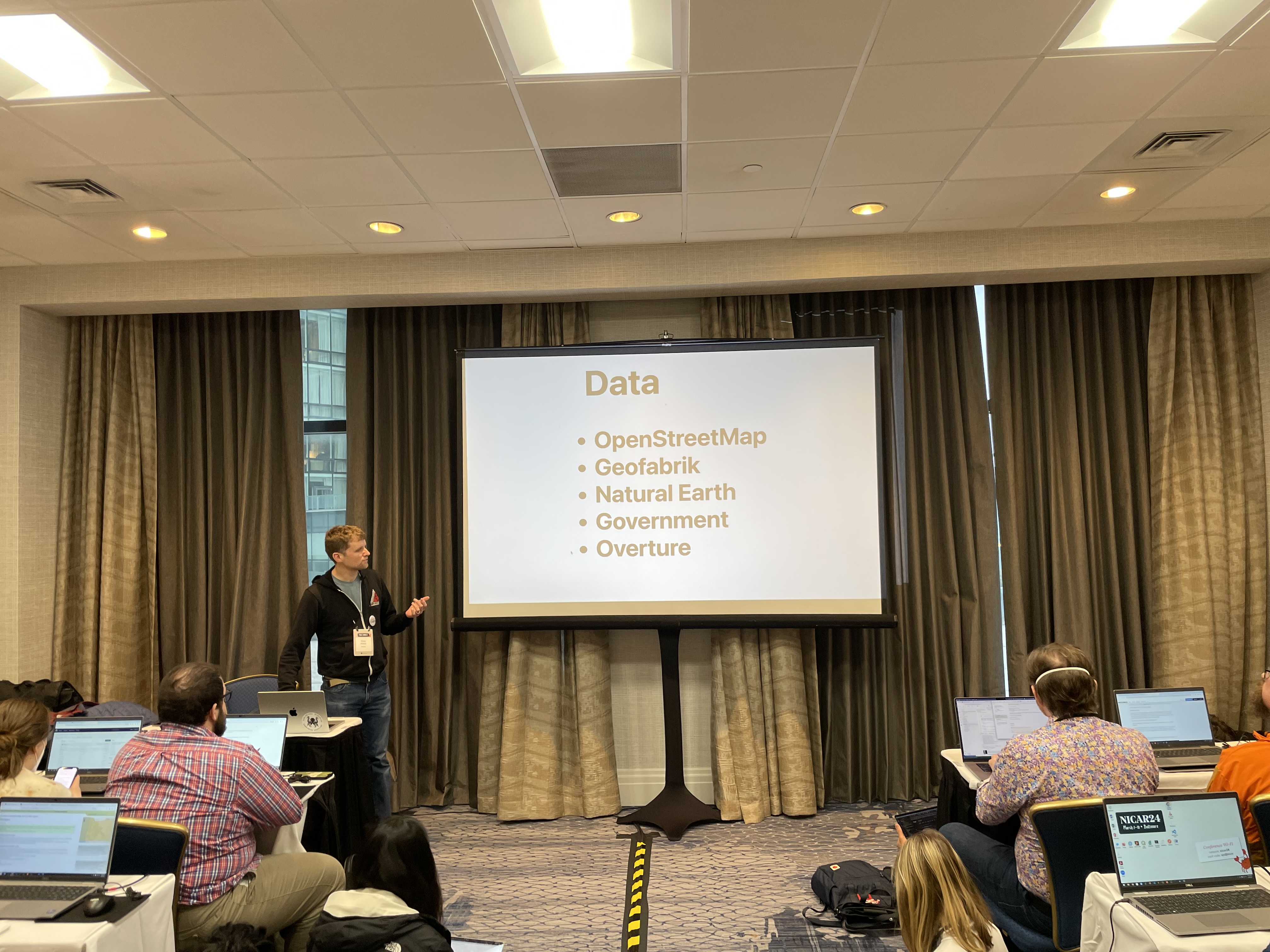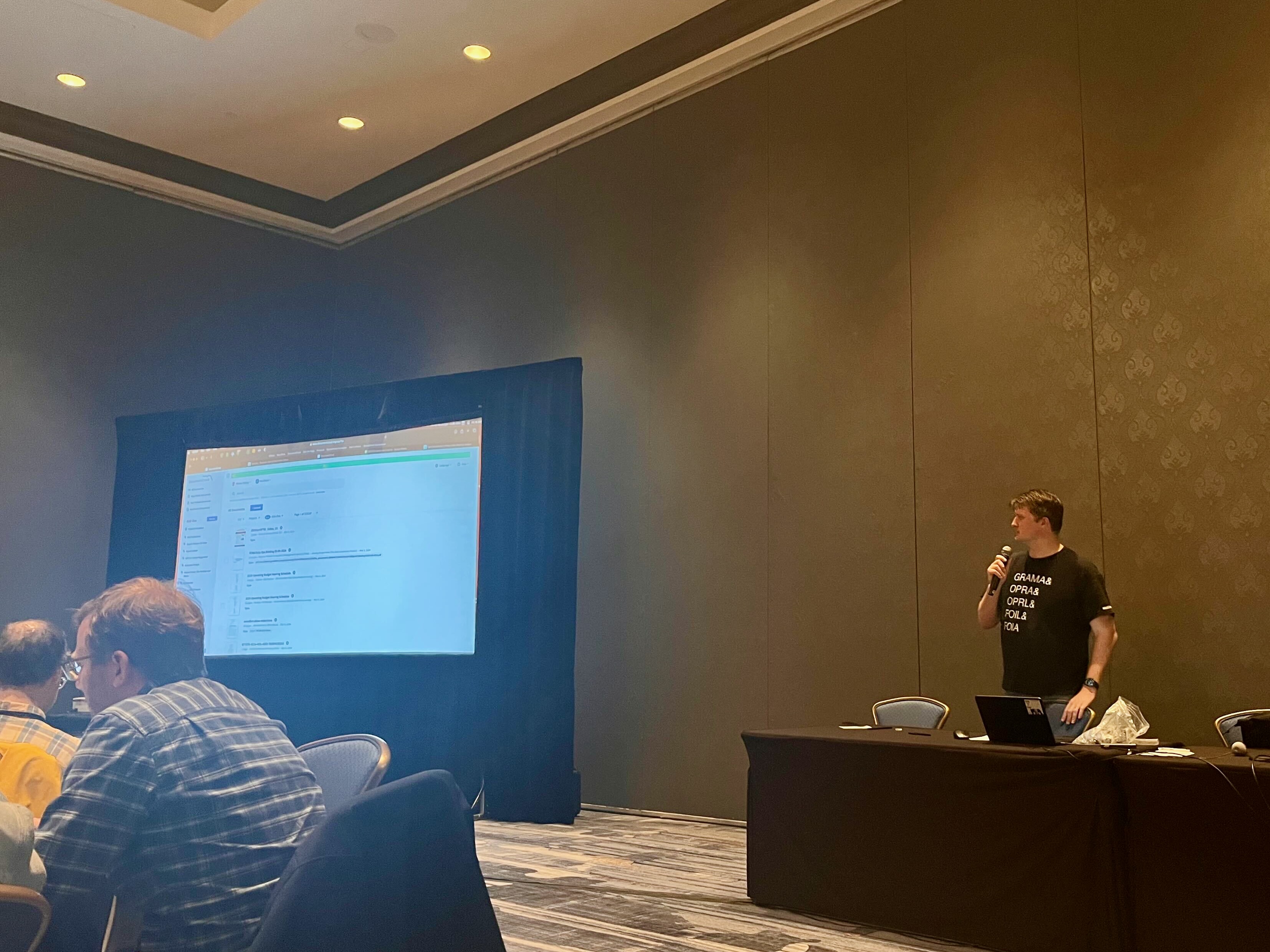The National Institute for Computer Assisted Reporting conference – popularly known as NICAR – is the annual data journalism conference, hosted by the industry group, Investigative Reporters and Editors. This year’s conference was held in Baltimore, Maryland, from March 7 to 10.
MuckRock hosted and participated in four sessions throughout the weekend, covering topics including self-hosted mapping, automation with DocumentCloud, data journalism on the environment beat and more. See what you might have missed from this year’s NICAR conference:
Text analysis in different languages for investigative journalism
MuckRock Senior Developer Chris Amico joined a panel discussion on how to work with text extracted from documents, social media and other sources. Amico also showed how newsrooms around the world are using DocumentCloud to power non-English-language investigations.
The panel included Fernanda Aguirre from The Examination; Josephine Lukito from the University of Texas at Austin; and Lam Thuy Vo from The Markup.
Backgrounding local elections: The questions, documents, and data the public needs
MuckRock Engagement Journalist Kelly Kauffman moderated a panel on backgrounding candidates for the upcoming 2024 elections, along with journalists Elizabeth Clemons from Sunlight Search, Albert Serna Jr. of OpenSecrets and Noah Pransky from NBC.
Panelists went over the basics of “backgrounding” political candidates, including how to analyze campaign finance records, request public records and build out a candidate’s “timeline.” The panel covered the behind the scenes work of MuckRock and Sunlight Search’s backgrounding of former Republican candidate Margarita Wilkinson in California’s 49th District.
Data and accountability on the climate change beat
MuckRock Data Journalist Dillon Bergin shared how reporters are using data to power better environmental coverage alongside Clayton Aldern from Grist, Savanna Strott from Public Health Watch and Emily Zentner from NPR’s California Newsroom.
Bergin presented MuckRock’s work with the Cicero Independiente in “The Air We Breathe” series, a project aboutair pollution in Cicero, Ill. The series has highlighted a history of violations by one of the town’s most well-known polluters and revealed that Cicero’s air quality is worse than surrounding Cook County neighborhoods.
How your newsroom can build a self-hosted map stack

Amico also shared his recent work exploring advances and opportunities to self-host maps in Saturday morning’s session. The hands-on session showed how a growing ecosystem of open source tools can let newsrooms build a map stack that is both entirely under their own control and significantly cheaper to run.
Automating your beat: Unredact documents, monitor websites, file better FOIAs and much more with the MuckRock portfolio
MuckRock co-founder Michael Morisy hosted a session showing how MuckRock can help reporters with everything from extracting spreadsheets to “unredacting” documents to getting alerts from your local city council meetings when a hot topic hits the agenda.

Morisy ran through a wide range of tools within MuckRock and DocumentCloud, available for verified journalists to start tapping into today.
The Update
-
Transparency coalition urges states to change FOIA laws: The Right on Transparency coalition released a new model policy Tuesday that urges five states – Alabama, Arkansas, Delaware, Tennessee and Virginia – to remove residency requirements from their open-records laws. Instead, the coalition argues that state Freedom of Information laws should allow “any person,” regardless of where they live, to submit a request for public records.
-
Sunshine Week lights the way: In honor of Sunshine Week, Daniel Schuman takes a look at the history of government transparency in the United States and how it’s essential for a functioning democracy.
-
New FOIA newsletter: Bloomberg News investigative journalist Jason Leopold launched FOIA files last week, a newsletter that goes behind the scenes of the public records request process and government secrecy. Leopold’s first newsletter explores how two employees from the Defense Intelligence Agency lodged complaints with the inspector general against Ben & Jerry’s, including claims that the ice cream company was anti-law enforcement.
-
FOIA staffing challenges: The federal government’s FOIA Advisory Committee discussed how some agencies are struggling to hire and retain FOIA professionals, reports Justin Doubleday for the Federal News Network. A survey of government FOIA officials found that 53% considered staffing to be their greatest resource need, according to a draft report.
-
New Jersey bill threatens public access to records: A New Jersey bill would limit public access to records kept by the state, including real estate transactions, dog licenses and court proceedings, reports Elise Young in The New York Times. The New Jersey Press Association argues that limiting access to government records would open the door to more government corruption.
-
Legal review of confidential law enforcement database: The Colorado Supreme Court will review an appellate ruling that allowed the state’s database of law enforcement officers to remain confidential, writes Jeffrey A. Roberts for the Colorado Freedom of Information Coalition.
-
Kentucky bill threatens public records access: After criticism from open government advocates, Kentucky House Bill 509 was revised because of the changes of the state’s open records law, reports Rebecca Grapevine in the Courier-Journal. However, Amye Bensenhaver, co-director of the Kentucky Open Government Coalition, says the new revision will cause “inevitable harm to the long-recognized and valued public right to know.”
FOIA Finds
-
Public records released about Juice WRLD: MuckRock user Bailey Pillon filed a request with the Cook County Clerk’s office in Illinois regarding the death of rapper Jarad Anthony Higgins, known by his stage name Juice WRLD. The request is still pending with the clerk’s office, requiring a fee for each requested report.
-
ICE flight records released: Through a public records request, the University of Washington’s Center for Human Rights obtained 1.73 million passenger records from nearly 15,000 ICE deportations flights to and from 88 U.S. airports, reports McKenzie Funk for ProPublica. ProPublica also reviewed 97 videos of deportations flights released by ICE online.
-
The enduring ‘Octopus:’ Netflix’s latest documentary, “American Conspiracy: The Octopus Murders,” explores the mysterious death of American journalist Danny Casolaro, while Casolaro was investigating the PROMIS affair. For MuckRock, Emma North-Best covered the enduring PROMIS mystery, including government wiretaps, the role of the Intelligence Community and the still-withheld FBI documents into Casolaro’s death.




